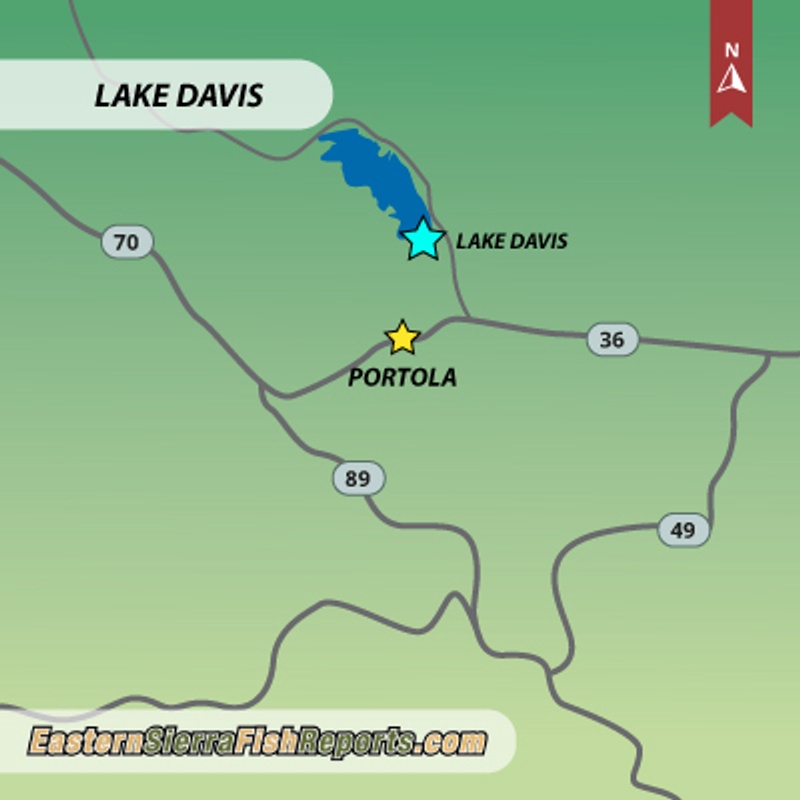Arizona Fish Report
Lake Davis Fish Report for 10-4-2007
Lake Davis Fish Report for 10-4-2007
Davis Lake poison treatment yields 75 percent catfish
Lake Davis - Portola, CA (Plumas County)

by Don Quilici
10-4-2007
According to a recent press release, the Calif. Department of Fish and Game (DFG) has finished chemically treating Lake Davis and all of its tributary streams.
DFG workers continued to collect and sample dead fish from both the reservoir and those washing ashore.
"We will continue to collect fish and monitor the chemicals as they break down in the reservoir," said Ed Pert, the Lake Davis Pike Eradication Project Manager. "The treatment phase of the project, which began on Sept. 10, went very well. We feel that all of the planning and preparation that went into this effort has really paid off."
DFG workers have collected an estimated 41,000 pounds of fish. The collected fish are bagged, put into a refrigerated truck and then transported by a Plumas County disposal company to a landfill near Reno.
Of the number of fish collected, about 8 percent sampled have been northern pike. The vast majority of fish collected (about 75 percent) have been brown bullheads. Rainbow trout collected have made up less than 1 percent of the total.
Other species found in the reservoir include largemouth bass, golden shiner, and pumpkinseed sunfish.
The dead fish pose no danger to wildlife, such as herons and coyote, which are scavenging in the area. The water is also safe for wildlife to drink.
Grizzly Valley Dam will remain shut off for up to 45 days to allow the compounds to degrade naturally in the reservoir. The U.S. Forest Service roads closure is still in effect, with check-in points to the project area on Grizzly Road and the upper end of West Street.
Below the dam area, spring flows and incoming groundwater will help feed Big Grizzly Creek and provide sufficient habitat for fish and other aquatic life.
Post-treatment stocking will begin when Lake Davis is free of any of the rotenone formulation compounds, which is anticipated to occur this year before the reservoir freezes over. At that time, DFG plans to stock about 117,000 sub-catchable and catchable-size rainbow trout in the lake and tributaries. In Spring 2008, about 900,000 fingerling, sub-catchable, catchable, and bonus size rainbow trout will be planted.
DFG workers continued to collect and sample dead fish from both the reservoir and those washing ashore.
"We will continue to collect fish and monitor the chemicals as they break down in the reservoir," said Ed Pert, the Lake Davis Pike Eradication Project Manager. "The treatment phase of the project, which began on Sept. 10, went very well. We feel that all of the planning and preparation that went into this effort has really paid off."
DFG workers have collected an estimated 41,000 pounds of fish. The collected fish are bagged, put into a refrigerated truck and then transported by a Plumas County disposal company to a landfill near Reno.
Of the number of fish collected, about 8 percent sampled have been northern pike. The vast majority of fish collected (about 75 percent) have been brown bullheads. Rainbow trout collected have made up less than 1 percent of the total.
Other species found in the reservoir include largemouth bass, golden shiner, and pumpkinseed sunfish.
The dead fish pose no danger to wildlife, such as herons and coyote, which are scavenging in the area. The water is also safe for wildlife to drink.
Grizzly Valley Dam will remain shut off for up to 45 days to allow the compounds to degrade naturally in the reservoir. The U.S. Forest Service roads closure is still in effect, with check-in points to the project area on Grizzly Road and the upper end of West Street.
Below the dam area, spring flows and incoming groundwater will help feed Big Grizzly Creek and provide sufficient habitat for fish and other aquatic life.
Post-treatment stocking will begin when Lake Davis is free of any of the rotenone formulation compounds, which is anticipated to occur this year before the reservoir freezes over. At that time, DFG plans to stock about 117,000 sub-catchable and catchable-size rainbow trout in the lake and tributaries. In Spring 2008, about 900,000 fingerling, sub-catchable, catchable, and bonus size rainbow trout will be planted.
More Reports
10-4-2007On Oct. 6-7, from 10 a.m. to 4 p.m. each day, the 18th annual Kokanee Salmon Festival will be held at the U.S. Forest Service (USFS) Visitor's Center at South Lake Tahoe, Calif. How to get there: Take U.S. 50 west to its junction with Calif. S.R. 89 (The "Y") at South Lake Tahoe. Then, take S.R. 89 north toward Camp Richardson and Tahoe City. Just past Camp Richardson, the Fallen Leaf Lake Road will be on your left. Continue...... Read More
Don Quilici Reports
for Thursday, September 27th, 2007: Fishing seasons to close for 2007
: Carson fly fishing club to meet on Oct. 3
: Recent fish plants in Western Nevada
Lake Sabrina: Sabrina Lake Fish 09-27-07
: Blue Lakes Fish Report 09-27-07
Bridgeport Reservoir: Bridgeport Reservoir Fish Report 09-27-07
Carson River: East Carson River Fish Report 09-27-07
Convict Lake: Convict Lake Fish Report 09-27-07
Crowley Lake: Crowley Lake Fish Report 09-27-07
Lake Davis: Davis Lake Fish Report 09-27-07
Heenan Lake : Heenan Lake Fish Report 09-27-07
Lahontan Reservoir: Lahontan Reservoir Fish Report 09-27-07
Mammoth Lakes : Mammoth Lakes Fish Report 09-27-07
Sacramento River: Sacramento River Fish Report 09-27-07
Sacramento River: Sacramento River Fish Report (2) 09-27-07
Lake Tahoe: South Shore Lake Tahoe Fish Report 09-27-07
Twin Lakes (Bridgeport): Twin Lakes Fish Report 09-27-07
Wild Horse Reservoir: Wildhorse Reservoir Fish Report 09-27-07

Arizona.FishReports.com © 2026. All Rights Reserved.
Website Hosting and Design provided by TECK.net
Website Hosting and Design provided by TECK.net